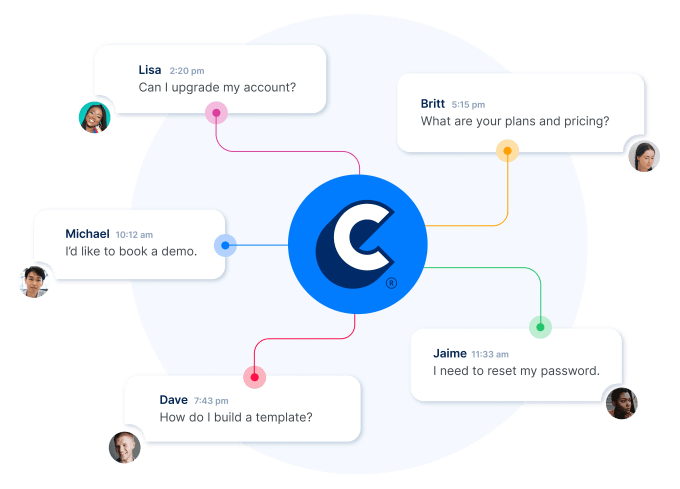Support automation firm Capacity grows with new cash and acquisitions

David Karandish has been busy.
Capacity, his support automation company, was planning a $5 million “bridge round” to help the company reach the break-even point. But TVC Capital, Toloka.vc, and the venture’s other backers had something grander in mind. So they threw in an additional $21 million for what became Capacity’s $26 million Series D.
While all this was happening, Capacity acquired three companies: enterprise search firm Lucy (which had raised $5.6 million) and two startups focused on customer service automation, Linc and Envision.
“It’s an exciting time of transformation at Capacity as we grow to help brands do more to automate interactions with customers and team members,” Karandish told TechCrunch. “We’re at an inflection point for AI and many businesses are realizing that they need a complete platform to be successful, rather than cobbling together a bunch of point solutions.”
Karandish co-founded Capacity with Chris Sims in 2017 as a part of Equity.com’s incubator program. After the $900 million exit of Answers.com (which Karandish also co-founded), Karandish says he wanted to start a business to address what he perceived as major blockers in customer service operations.
“Rising costs have placed pressure on support teams to do more with less,” Karandish said. “At the same time, consumer expectations are shifting rapidly where consumers both want self-service but are increasingly frustrated by lackluster experiences. Our goal with Capacity is to provide a great customer experience while also recognizing that escalating to a human is the right thing to do in many cases.”
Capacity connects to a company’s tech stack to answer queries and automate support tasks. The platform mines information from files, apps like Gmail, customer relationship management software, and more to build a knowledge base that Capacity’s chatbot and helpdesk tools can pull from.
Employees can ask Capacity’s chatbot questions like “What was added to the merger contract yesterday?,” or even instruct it to do things like updating the status of a sales lead. The chatbot and helpdesk can also deliver companywide announcements, like news and event notifications. And they can be made external-facing (with filters to hide sensitive data, mind you), embedded on a company’s website to answer common customer questions.

“We view Capacity as having the ease-of-use of a tool like Zendesk with the automation chops of a ServiceNow,” Karandish said. “From an approach standpoint, we are executing a very similar playbook to Parker Conrad’s ‘compound model’ — except in our case, we’re focused on support.”
Innovations in self-service software — including AI — are making them a more attractive solution to companies than they have been in the past. For example, Cleverly.ai — which Zendesk acquired in August 2022 — finds answers to customers’ questions by creating a knowledge layer on top of applications. Meanwhile, Directly taps algorithms trained by subject-matter experts to strategically answer customer issues in a variety of different messaging channels.
Customers like self-service options. According to a Zendesk poll, 67% prefer them over interacting with customer support. But it can be difficult to get them right. A Gartner survey found that, on average, only 14% of customer service and support issues are fully resolved in self-service.
Capacity will upgrade and expand its product portfolio through its recent acquisitions.
Karandish sees Lucy’s offering, which ingests and analyzes data from enterprise apps and systems, augmenting Capacity’s existing indexing technology. Envision, meanwhile, will help Capacity customers flag unresolved chats and calls and train human agents. And Linc will bring self-service tools for retail and e-commerce to Capacity, said Karandish.
The plan is for Lucy’s co-founders, Dan Mallin, Scott Litman, and Marc Dispensa, to join Capacity to help lead products and teams integration. Envision CEO Rodney Kuhn will oversee contact center solutions at Capacity, and Linc founder and CEO Fang Cheng will lead Capacity’s e-commerce efforts.
To date, Capacity has acquired eight companies — the other five being Textel, LumenVox, Denim Social, SmartAction, and CereProc — and raised more than $89 million.
Karandish said that the newest tranche will be put toward growing Capacity’s headcount to 200 people by the end of the year as the Saint Louis-based company “heads toward profitability.” Capacity’s customer base now stands at over 2,500 brands, he added, while its annual recurring revenue is nearly $50 million.
“Our growth strategy reflects what our customers are asking for: an all-in-one AI platform that delivers across all communication channels,” he added. “We’ve identified 24 steps of the customer experience that are ripe for support automation … Each acquisition adds specific tech and talent to help Capacity become a leading provider of AI-powered solutions for customer and employee experience.”
Source: https://techcrunch.com


